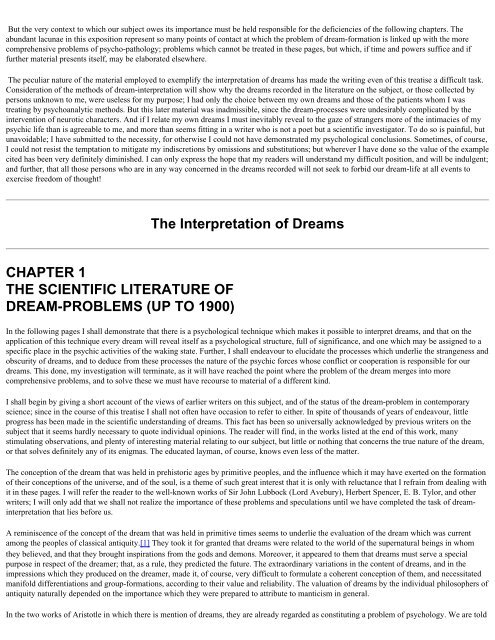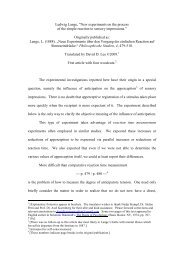The Interpretation Of Dreams Sigmund Freud (1900) PREFACE
The Interpretation Of Dreams Sigmund Freud (1900) PREFACE
The Interpretation Of Dreams Sigmund Freud (1900) PREFACE
Create successful ePaper yourself
Turn your PDF publications into a flip-book with our unique Google optimized e-Paper software.
But the very context to which our subject owes its importance must be held responsible for the deficiencies of the following chapters. <strong>The</strong><br />
abundant lacunae in this exposition represent so many points of contact at which the problem of dream-formation is linked up with the more<br />
comprehensive problems of psycho-pathology; problems which cannot be treated in these pages, but which, if time and powers suffice and if<br />
further material presents itself, may be elaborated elsewhere.<br />
<strong>The</strong> peculiar nature of the material employed to exemplify the interpretation of dreams has made the writing even of this treatise a difficult task.<br />
Consideration of the methods of dream-interpretation will show why the dreams recorded in the literature on the subject, or those collected by<br />
persons unknown to me, were useless for my purpose; I had only the choice between my own dreams and those of the patients whom I was<br />
treating by psychoanalytic methods. But this later material was inadmissible, since the dream-processes were undesirably complicated by the<br />
intervention of neurotic characters. And if I relate my own dreams I must inevitably reveal to the gaze of strangers more of the intimacies of my<br />
psychic life than is agreeable to me, and more than seems fitting in a writer who is not a poet but a scientific investigator. To do so is painful, but<br />
unavoidable; I have submitted to the necessity, for otherwise I could not have demonstrated my psychological conclusions. Sometimes, of course,<br />
I could not resist the temptation to mitigate my indiscretions by omissions and substitutions; but wherever I have done so the value of the example<br />
cited has been very definitely diminished. I can only express the hope that my readers will understand my difficult position, and will be indulgent;<br />
and further, that all those persons who are in any way concerned in the dreams recorded will not seek to forbid our dream-life at all events to<br />
exercise freedom of thought!<br />
CHAPTER 1<br />
THE SCIENTIFIC LITERATURE OF<br />
DREAM-PROBLEMS (UP TO <strong>1900</strong>)<br />
<strong>The</strong> <strong>Interpretation</strong> of <strong>Dreams</strong><br />
In the following pages I shall demonstrate that there is a psychological technique which makes it possible to interpret dreams, and that on the<br />
application of this technique every dream will reveal itself as a psychological structure, full of significance, and one which may be assigned to a<br />
specific place in the psychic activities of the waking state. Further, I shall endeavour to elucidate the processes which underlie the strangeness and<br />
obscurity of dreams, and to deduce from these processes the nature of the psychic forces whose conflict or cooperation is responsible for our<br />
dreams. This done, my investigation will terminate, as it will have reached the point where the problem of the dream merges into more<br />
comprehensive problems, and to solve these we must have recourse to material of a different kind.<br />
I shall begin by giving a short account of the views of earlier writers on this subject, and of the status of the dream-problem in contemporary<br />
science; since in the course of this treatise I shall not often have occasion to refer to either. In spite of thousands of years of endeavour, little<br />
progress has been made in the scientific understanding of dreams. This fact has been so universally acknowledged by previous writers on the<br />
subject that it seems hardly necessary to quote individual opinions. <strong>The</strong> reader will find, in the works listed at the end of this work, many<br />
stimulating observations, and plenty of interesting material relating to our subject, but little or nothing that concerns the true nature of the dream,<br />
or that solves definitely any of its enigmas. <strong>The</strong> educated layman, of course, knows even less of the matter.<br />
<strong>The</strong> conception of the dream that was held in prehistoric ages by primitive peoples, and the influence which it may have exerted on the formation<br />
of their conceptions of the universe, and of the soul, is a theme of such great interest that it is only with reluctance that I refrain from dealing with<br />
it in these pages. I will refer the reader to the well-known works of Sir John Lubbock (Lord Avebury), Herbert Spencer, E. B. Tylor, and other<br />
writers; I will only add that we shall not realize the importance of these problems and speculations until we have completed the task of dreaminterpretation<br />
that lies before us.<br />
A reminiscence of the concept of the dream that was held in primitive times seems to underlie the evaluation of the dream which was current<br />
among the peoples of classical antiquity.[1] <strong>The</strong>y took it for granted that dreams were related to the world of the supernatural beings in whom<br />
they believed, and that they brought inspirations from the gods and demons. Moreover, it appeared to them that dreams must serve a special<br />
purpose in respect of the dreamer; that, as a rule, they predicted the future. <strong>The</strong> extraordinary variations in the content of dreams, and in the<br />
impressions which they produced on the dreamer, made it, of course, very difficult to formulate a coherent conception of them, and necessitated<br />
manifold differentiations and group-formations, according to their value and reliability. <strong>The</strong> valuation of dreams by the individual philosophers of<br />
antiquity naturally depended on the importance which they were prepared to attribute to manticism in general.<br />
In the two works of Aristotle in which there is mention of dreams, they are already regarded as constituting a problem of psychology. We are told



